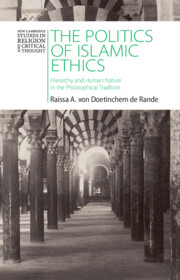Refine search
Actions for selected content:
18 results

The Politics of Islamic Ethics
- Hierarchy and Human Nature in the Philosophical Tradition
-
- Published online:
- 29 June 2025
- Print publication:
- 10 July 2025
Roads to Rome: how visions of elitism and pluralism shake up the goal repertoire of electoral competition
-
- Journal:
- Italian Political Science Review / Rivista Italiana di Scienza Politica , First View
- Published online by Cambridge University Press:
- 23 January 2025, pp. 1-16
-
- Article
- Export citation
Chapter 6 - The Community of Shame
-
- Book:
- Schopenhauer's Politics
- Published online:
- 09 January 2025
- Print publication:
- 23 January 2025, pp 202-219
-
- Chapter
-
- You have access
- Open access
- HTML
- Export citation
2 - Setting the Stage: Conceptualizing the “Pashtun Borderland”
-
- Book:
- The Pashtun Borderland
- Published online:
- 06 December 2024
- Print publication:
- 19 December 2024, pp 13-38
-
- Chapter
- Export citation
Conclusion: The Fate of Feeling
-
- Book:
- Romantic Music Aesthetics
- Published online:
- 22 November 2024
- Print publication:
- 21 November 2024, pp 219-236
-
- Chapter
- Export citation
1 - Plural Beginnings
-
- Book:
- Sharing Freedom
- Published online:
- 28 March 2024
- Print publication:
- 04 April 2024, pp 31-74
-
- Chapter
- Export citation
11 - A Pluralistic Model in the Making
-
- Book:
- Exploring Religious Pluralism
- Published online:
- 14 March 2024
- Print publication:
- 21 March 2024, pp 178-193
-
- Chapter
- Export citation
Chapter 5 - Subsidised Theatre
- from Part II - Theatre Sectors
-
-
- Book:
- The Cambridge Companion to British Theatre since 1945
- Published online:
- 14 March 2024
- Print publication:
- 21 March 2024, pp 102-122
-
- Chapter
- Export citation
7 - Rhetoric in Times of Crisis and Doubt
- from Part II - Political Rhetoric in Practice
-
- Book:
- Political Rhetoric in Theory and Practice
- Published online:
- 02 November 2023
- Print publication:
- 16 November 2023, pp 209-257
-
- Chapter
- Export citation
6 - The Limits of Democratic Perfectionism
-
- Book:
- Stanley Cavell's Democratic Perfectionism
- Published online:
- 17 August 2023
- Print publication:
- 31 August 2023, pp 206-246
-
- Chapter
- Export citation
Chapter 6 - Wisdom for the Many, and Wisdom for the Few
- from Part III - After Julian: Philosophy in the World
-
- Book:
- Christianity, Philosophy, and Roman Power
- Published online:
- 07 July 2023
- Print publication:
- 01 June 2023, pp 267-301
-
- Chapter
- Export citation
‘I Still See the Elitism’. Classical languages and the language of class at Liverpool
-
- Journal:
- Journal of Classics Teaching / Volume 24 / Issue 47 / Spring 2023
- Published online by Cambridge University Press:
- 11 July 2022, pp. 26-33
-
- Article
-
- You have access
- Open access
- HTML
- Export citation
3 - “Democratic Dissonance”
-
- Book:
- The Law As a Conversation among Equals
- Published online:
- 25 April 2022
- Print publication:
- 21 April 2022, pp 32-50
-
- Chapter
- Export citation
13 - Judicial Review
-
- Book:
- The Law As a Conversation among Equals
- Published online:
- 25 April 2022
- Print publication:
- 21 April 2022, pp 183-201
-
- Chapter
- Export citation
Elitism in Democracy: Du Bois, Nietzsche, and the Role of Elites for the Common Good
-
- Journal:
- Du Bois Review: Social Science Research on Race / Volume 19 / Issue 2 / Fall 2022
- Published online by Cambridge University Press:
- 15 November 2021, pp. 381-397
-
- Article
- Export citation
Introduction
-
- Book:
- Modernity in Black and White
- Published online:
- 06 April 2021
- Print publication:
- 15 April 2021, pp 1-25
-
- Chapter
- Export citation
Chapter 8 - Issues and Attitudes
-
- Book:
- English around the World
- Published online:
- 25 September 2020
- Print publication:
- 30 July 2020, pp 221-246
-
- Chapter
- Export citation
18 - After the Backlash
- from Part III - Transnational Law
-
-
- Book:
- The Many Lives of Transnational Law
- Published online:
- 18 March 2020
- Print publication:
- 02 April 2020, pp 441-458
-
- Chapter
- Export citation
